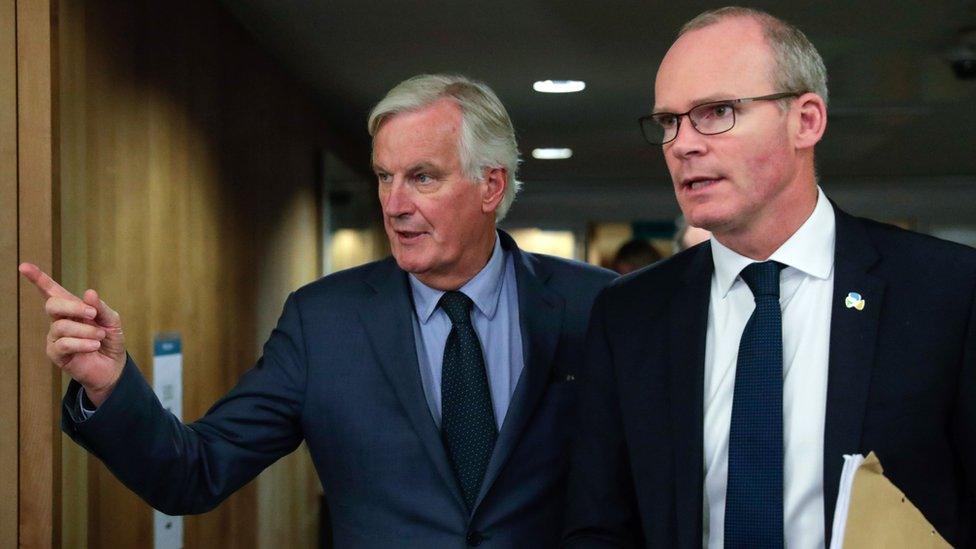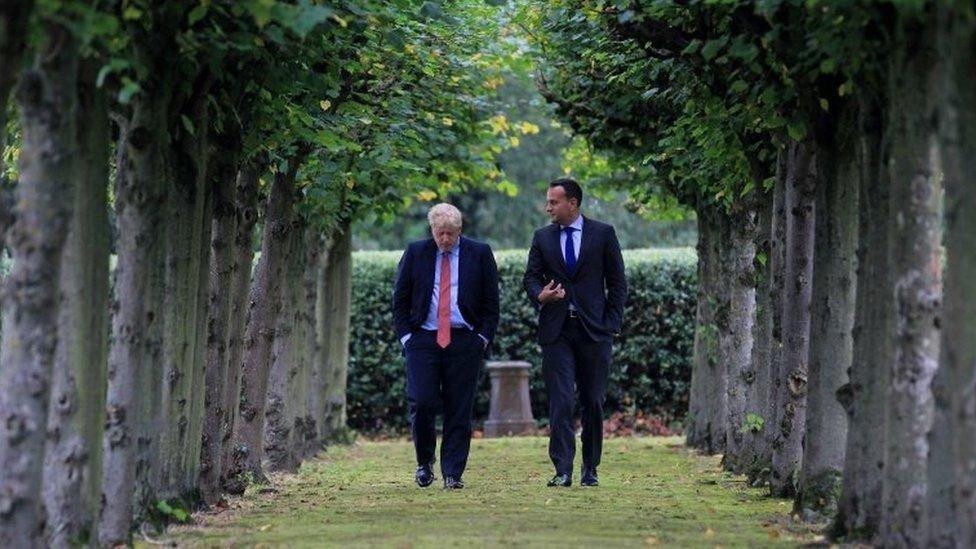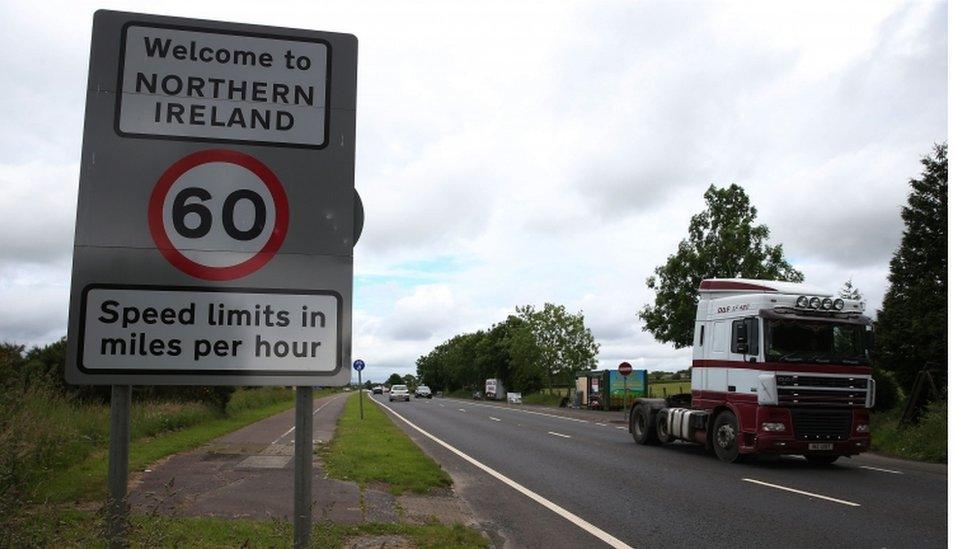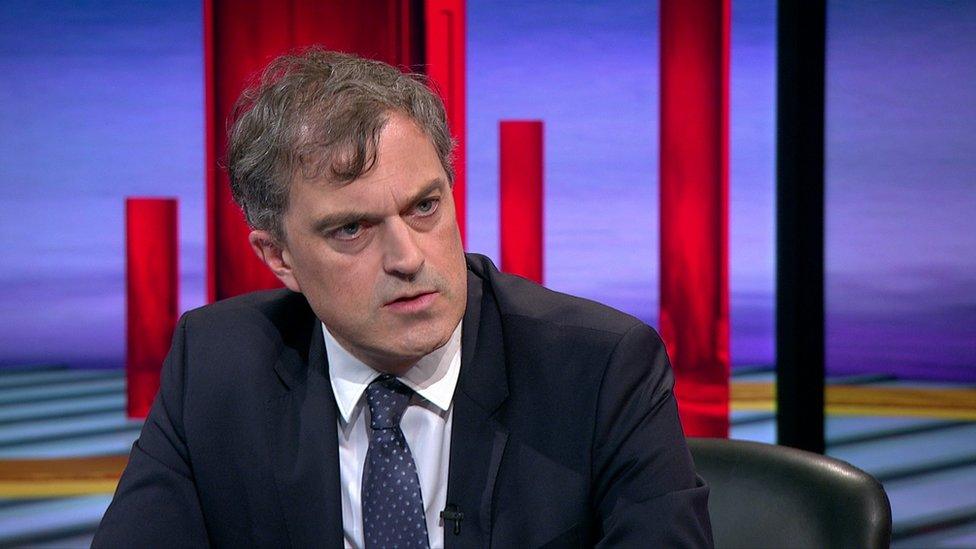Brexit: What are the chances of a deal being reached?
- Published

Simon Coveney and European Union's Chief Brexit Negotiator Michel Barnier
Ireland's foreign minister struck a cautiously optimistic note on Brexit at a meeting of EU foreign ministers on Monday morning.
"A deal is possible and it is possible this month, maybe even this week but we are not there yet," Simon Coveney said.
Talks have been taking place in Brussels.
The EU's Chief Negotiator Michel Barnier had seemed a little more downbeat on Sunday, telling ambassadors that "a big gap remains".
What are the sticking points?
A briefing note from Mr Barnier's team, seen by the BBC, said the two big issues are customs and consent.
The prime minister has said that Northern Ireland must leave the EU customs union with the rest of the UK.
But that will mean a new customs border on the island of Ireland.
Boris Johnson said most customs checks or processes could take away from the border at company premises.
However his plan, published earlier this month, did leave open the possibility of new customs posts.
The EU has said this would mean the UK going back on commitments it made almost two years ago.
There would also have to be some mechanism for citizens in Northern Ireland to give democratic consent to any special arrangements.
The UK plan to give the Northern Ireland Assembly an initial veto on any arrangement along with a reapproval every four years has been rejected by the EU.
It was also strongly criticised by NI business groups who said it would mean constant uncertainty which would deter investment.
New thinking on customs?
The UK appears to be partially reviving an idea from earlier in the Brexit process known as the New Customs Partnership.
It was an idea which aimed to square the circle; preventing a customs border in Ireland while allowing all of the UK to have an independent tariff policy.
It would have involved the UK applying EU tariffs to all goods arriving into the UK that were intended to ultimately go into the EU.
Essentially the UK would act as the EU's customs agent.
The EU rejected it at the time as unworkable, though Taoiseach (Irish PM) Leo Varadkar described it as "a welcome suggestion" and "perhaps something we could make workable".
The idea is now being revived to apply to Northern Ireland only.
The important point for the government is that it would mean Northern Ireland would legally leave the EU's customs union.
For the EU it would mean customs processes happening at Irish Sea ports rather than at new customs posts inland.
It would have to involve customs declarations on goods coming from Great Britain into Northern Ireland.
But that principle of declaring goods on internal trade has already been conceded by the UK in relation to another part of its plan, which would mean Northern Ireland continuing to follow EU rules on product standards.

On Thursday, the prime minister and taoiseach met at Thornton Manor
The question of workability remains.
How do you know which goods are destined for either the NI market or the EU market and therefore the correct tariff has been applied & paid to the correct revenue authority?
Use of trusted trader schemes, tracking of goods to point of use and a rebate scheme, where you'd always pay the EU tariff but get your money back when you can show the good has stayed in NI, have all been mentioned.
The relatively small size of the NI economy may make the plans more workable.
However, EU negotiators still appear sceptical and the prime minister's allies in the DUP have also expressed concerns.
New thinking on consent
Michel Barnier's briefing note suggested the UK has dropped its proposals to include an up-front veto for the Stormont Assembly before any new arrangements for Northern Ireland come into force.
But the UK is still seeking the power for Northern Ireland to leave the arrangements at some point in the future.
All this will cause great concern in the DUP, who had been explicit that what was originally proposed amounted to a unionist veto.
The unionist veto would be possible because of Stormont's parallel consent voting system.
Last week, the NI Secretary Julian Smith told the BBC there will not be a situation where "one community has a veto" over Brexit plans.
Mr Smith also did not deny that a NI-only referendum was one option on the table.
A referendum would subject the plans to direct democratic approval without Stormont wrangling.
Is there time to agree to any of this?
It seems unlikely this can all be wrapped up in the next 48 hours, ahead of a summit of EU leaders.
The customs plans in particular would seem to require a lot of work to make them legally and operational feasible.
If there is no deal to present to Parliament by Saturday the Benn Act requires the prime minister to ask for a further Brexit delay.
It may be that if the negotiations edge forward he can present that as a "technical extension" which will allow a deal to be finalised.
- Published14 October 2019

- Published11 October 2019
